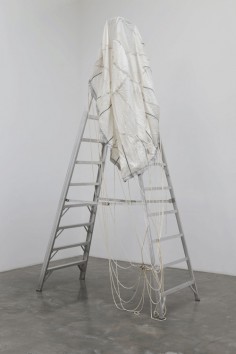Tom Burr
汤姆·伯尔
12 Steps to Hell
source: artsynet
In his spare, enigmatic, mixed-media sculptures and installations, Tom Burr explores the ways in which we imbue the spaces and things by which we are surrounded—like clothing, furniture, or the patterns in wood—with our memories and emotions. As he explains: “I know that objects retain the stain of people and that our memory can be physically located out of longing or grief.” Though his work is grounded in his own memories, it is deliberately ambiguous, allowing viewers to invest it with their own life experiences. He uses what he calls a “focused spectrum” of humble materials and found objects, including plywood, old blankets and t-shirts, radiators, doors, books, and bits of hardware. By draping a pair of nylons over a radiator, encasing sneakers in yellow Plexiglas, or constructing stripped-down rooms, Burr makes his (and our) memories material.
.
.
.
.
.
.
.
source: artspace
American Conceptual artist Tom Burr takes inspiration from Minimalism and Post-Minimalism—as well as from sculpture, design, and poetry—to create his own enigmatic output. Artists such as Robert Smithson, Eva Hesse, and Gordon Matta-Clark serve as important touchstones in his practice, particularly the work of sculptor Tony Smith, upon whom the artist based an ongoing series. Burr utilizes a variety of unlikely materials to achieve his ends, those being, the artist told T Magazine in 2011, “a fairly wide but focused spectrum that includes, but is not limited to wood, paint, fabric, hardware, plastic, mirror, paper, occasional images (usually found), books, chairs, lamps, clothing, ladders, doors, and radiators.” Meanwhile, Burr’s work explores themes as diverse as the changing temperature of objects to Anthony Burgess’s 1962 novel A Clockwork Orange.
Burr was born in New Haven, Connecticut in 1963. He studied at the School of Visual Arts in New York and then attended the Whitney Independent Study Program. His work has been exhibited throughout the U.S. and Europe at institutions such as the Museum of Contemporary Art in North Miami, the Jewish Museum of Belgium in Brussels, the CCA Wattis Institute for Contemporary Arts in San Francisco, and New York’s SculptureCenter. Burr currently lives and works in Norfolk, Connecticut and in New York City. His work is in the collections of institutions such as the Museum of Contemporary Art in Los Angeles, the New York Public Library, and the Baltimore Museum.
.
.
.
.
.
.
.
source: ocula
Tom Burr is an American conceptual artist, based in New York. Burr attended the Educational Center for the Arts High School, a multi-arts program taught in part by Yale University graduate students. Burr’s senior year thesis work reflected the Minimalist and Post-Minimalist movement, by merging sculptural elements with brief poetic texts.
In the late 1990s Burr embarked on a body of work that remains ongoing; derived from the language and forms of both Tony Smith’s sculptures, on the one hand, and closed architectural spaces such as bars, cages and boxes. These works, often borrowing Smith’s matte black palate, evoke spaces of control and containment, as well as the “safe zones” of underground cultures.
Alongside these works, Burr developed his now iconic Bulletin Boards, originally created out of the excessive collecting of images and materials that are part of his working methods. Constructed through plays of juxtaposition, the boards are markers of place, often reflecting the situation of their exhibition.


